At SpeedX Marketing, we are a leading provider of innovative IT solutions tailored to meet your specific business needs. With years of expertise and a team of skilled professionals, we offer cutting-edge technology solutions that drive growth and efficiency.

Standing out in the crowded legal market can be a formidable challenge. As potential clients increasingly turn to the internet to find legal services, mastering local SEO (Search Engine Optimization) is no longer optional—it’s crucial. Local SEO for law firms is an essential strategy to promote your practice’s presence in local search results, ensuring you’re the go-to option for potential clients in your area.This practice is vital, as it aligns with the modern consumer’s approach to finding legal services. According to The National Law Review, 96% of individuals searching for legal advice utilize a search engine. This statistic highlights the critical importance of a robust online presence for legal professionals. By optimizing for local SEO, law firms can strategically position themselves to capture this considerable portion of the market, ensuring they are not only found but also perceived as credible and relevant by those seeking legal representation.
Local SEO for law firms is all about enhancing your practice’s online presence so potential clients in your area can easily find you when they search for legal services. It’s like making sure your firm stands out on a crowded digital street, without needing to pay for ads. This involves a mix of strategies like crafting helpful blog content, speeding up your website, and gathering glowing Google reviews. With a smart local SEO approach, your law firm can achieve those coveted high rankings in search results, driving more clients to your door naturally and effectively.
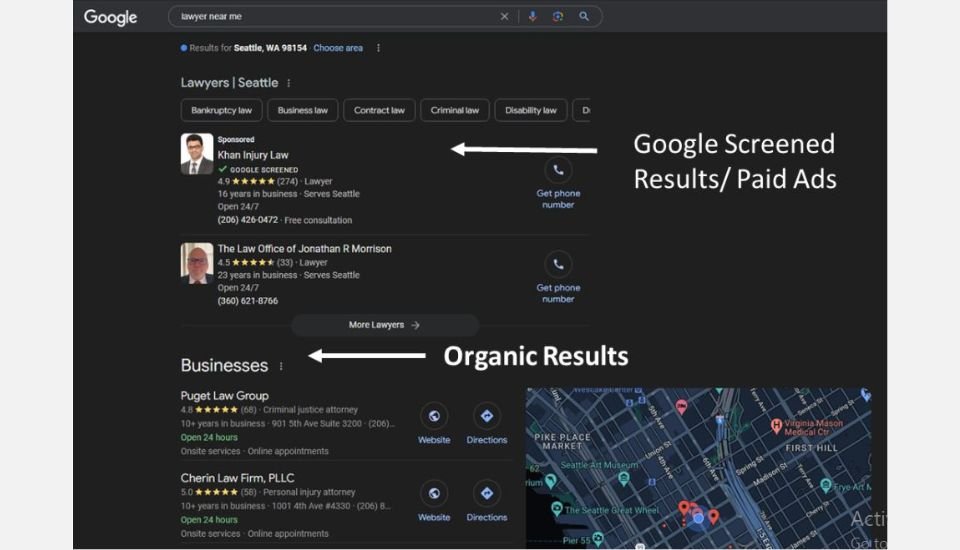
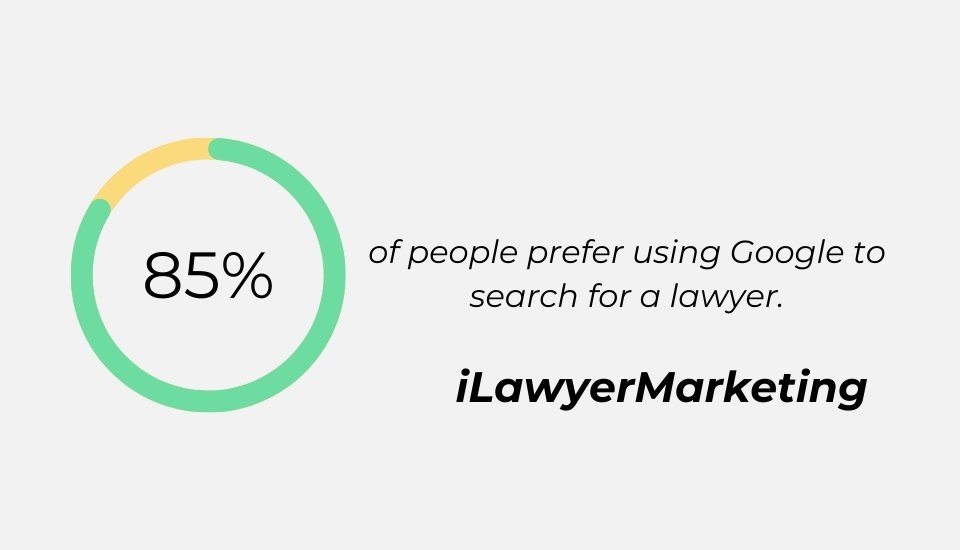
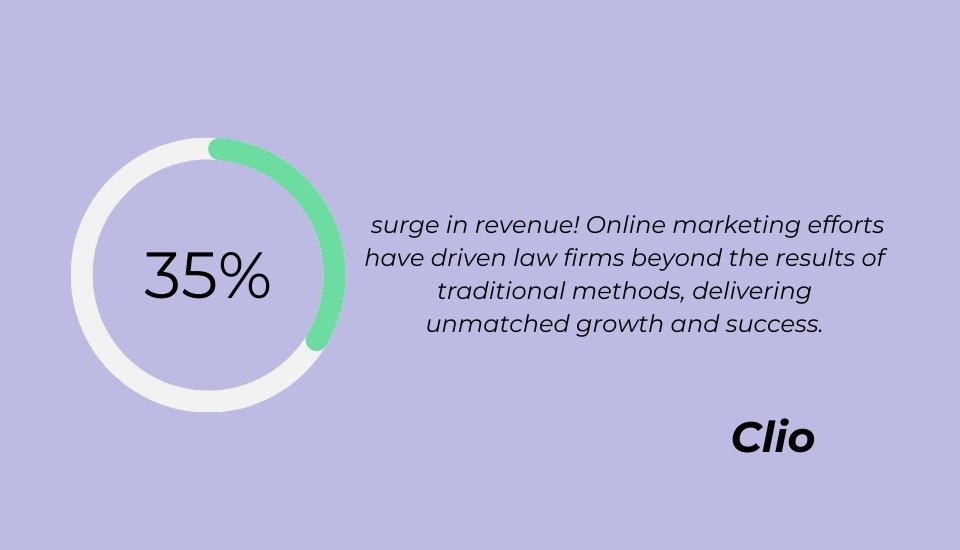
For law firms, a strong local SEO strategy means the difference between being discovered by new clients or getting lost in the digital shuffle. By harnessing the power of local SEO, your law firm can dominate search results, attract more qualified leads, and ultimately, grow your practice. Ready to elevate your firm’s online presence and become the go-to legal expert in your community? Let’s dive into the world of local SEO for law firms!
To dominate search engine results pages (SERPs) and other search engines, law firms need effective strategies that enhance visibility and attract potential clients. Read below to discover proven techniques that can help your law firm rise above the competition and achieve top rankings.
Creating and optimizing a Google Business Profile (GBP) for law firms is the first step for enhancing local visibility and attracting potential clients. Here’s a detailed guide tailored for law firms, addressing various aspects from setup to optimization, and discussing the differences between individual practices and law firms.
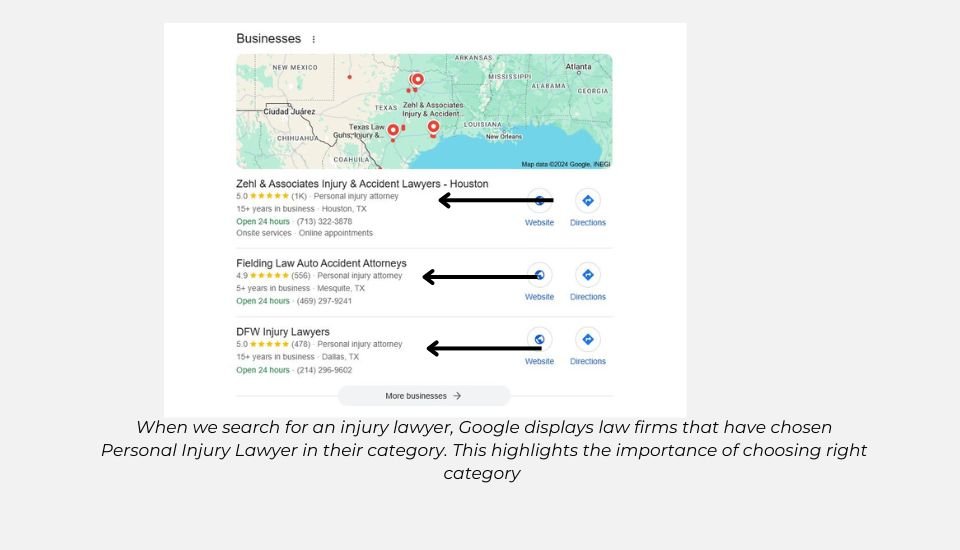
In local SEO, distinguishing between profiles for individual legal practitioners and law firms on Google Business Profile (GBP) is essential, as each serves unique purposes and audiences. Law firm profiles highlight the collective expertise of the firm, offering comprehensive branding that showcases its history, multiple practice areas, team qualifications, and notable cases, appealing to a diverse client base. For example, a firm like Ankin Law may cover areas such as criminal defense, family law, and corporate law under one unified presence. In contrast, individual practitioner profiles emphasize personal achievements, including educational background, awards, and specialization, positioning the lawyer as an expert in a specific legal field to attract targeted clients. Visibility also varies, with law firms listing broad practice areas to showcase versatility, while individual profiles focus on niche expertise. Additionally, review management for individuals ensures continuity, as reviews follow them if they change firms, whereas law firm reviews reflect the collective reputation of the firm, offering stability despite personnel changes. Recognizing these distinctions allows both individual lawyers and law firms to optimize their online presence, attract the right clients, and strengthen their reputation in the competitive legal industry.
Setting up and verifying your Google Business Profile (GBP) is an essential step for law firms aiming to enhance their online visibility and attract more clients. Given the highly competitive nature of legal marketing, having a well-optimized GBP can significantly improve your chances of appearing in local search results, thereby driving more traffic to your firm. Here’s a detailed guide on how to create and verify your GBP for a law firm, ensuring that it’s both effective and compliant.
When creating a Google Business Profile (GBP), the name you choose is paramount as it serves as your business’s primary identifier in the digital landscape. This name is not only a crucial element of your brand’s identity but also a key factor in how clients perceive and remember your business. Ensuring consistency of your legal business name across all platforms, especially on your Google Business Profile, is essential for maintaining brand integrity and optimizing search engine performance.
Including relevant keywords in your business name can enhance visibility for specific search queries, such as “Personal Injury” or “Criminal Defense,” which can attract potential clients searching for those services. However, it’s important to avoid overloading the name with keywords, as this can dilute your brand and appear unprofessional.
Before making any changes, consider the implications for your law firm, ensure compliance with local regulations regarding trade names, and make sure any official name changes are reflected with relevant legal entities to avoid potential issues, such as GBP listing suspension. Consistent, well-thought-out naming on your Google Business Profile can significantly impact your local SEO, helping clients find you more easily and fostering a strong, recognizable presence in your market.
Choosing the right category for your Google Business Profile is not just a trivial step; it’s a crucial aspect that directly affects your business’s visibility and ranking on Google. The primary category you select serves as a strong ranking signal to Google’s algorithms, indicating the main focus of your business. This, in turn, helps Google to present your business to users who are searching for related services. Accurate categorization ensures that your business appears in relevant searches, thus increasing the chances of attracting potential clients. Conversely, an incorrect category can lead to your business being displayed in irrelevant search results, diminishing visibility and potentially leading to lost business opportunities.
For legal professionals, selecting the appropriate category is particularly vital because the legal field encompasses a wide range of specializations, each catering to different client needs. Below, we delve into specific legal categories available on Google Business Profiles, exploring when to use each as a primary category and when to add them as additional categories to enhance your business’s searchability and client reach.
“Law Firms” is an ideal primary category for businesses that provide a broad range of legal services and house multiple attorneys with varied specializations. This category suits larger establishments that cover diverse areas of law such as civil litigation, corporate law, family law, and more. It’s perfect for firms that aim to attract clients looking for comprehensive legal solutions under one roof.
This category is less useful as an additional one since it is broad. Instead, it’s more effective to specify the types of legal services provided if you choose a more niche category as your primary.
“Attorney” is a versatile category that can be used by individual legal practitioners or small law offices offering general legal services.Opt for this category if your practice does not focus on a specific type of law but rather provides general legal counsel. It’s suitable for solo practitioners or small offices where the attorney might handle various legal matters. Use this as an additional category if your primary category is more specific (e.g., “Family Law Attorney”) to capture a broader search audience. Here are some attorney subcategories; selecting a specific category that aligns with your goals can significantly improve your rankings and visibility
A broad category for any legal professional. Use this as a primary category if you prefer a general identification. It’s suitable for solo practitioners or firms that do not wish to specify a niche. Add this category alongside more specific categories to increase visibility under general legal searches. Following are some specific categories.
Focuses on medical-related legal issues, including malpractice and healthcare law. Select this category if your practice specializes in representing clients in medical malpractice cases, healthcare disputes, or legal issues involving medical institutions. Add this if your main practice involves broader personal injury or health-related legal services.
Choosing the right category for your Google Business Profile is crucial for your business’s online presence and visibility. Each legal category serves a unique function and caters to specific client needs, making it essential to select and add categories that accurately reflect your services. By doing so, you enhance your chances of being discovered by potential clients searching for legal services that match your expertise.
Displaying precise working hours on your Google Business Profile helps clients know when they can reach out to you or visit your office. This builds trust and ensures they contact you during business hours, avoiding missed opportunities.
Including special hours for holidays or other events ensures clients are aware of any deviations from your regular schedule. Keeping your hours updated is crucial to avoid client frustration. Regularly review and update your working hours to reflect any changes, such as holiday schedules or extended hours.
A direct link to your law firm’s website on your Google Business Profile acts as a bridge, allowing potential clients to access detailed information about your services, read client testimonials, and contact you directly. This not only drives traffic but also enhances your firm’s credibility.
Accurately listing your law firm’s location on your Google Business Profile is crucial for appearing in local search results and ensuring clients can easily find your office. This is especially important for law firms, as clients typically look for legal services within a specific geographical area. To add your location, go to the ‘Info’ section of your Google Business Profile, find the ‘Address’ option, and click the pencil icon to edit. Enter your full address, including street, unit/suite, city, state, and zip code, and verify the address if prompted. Google may require verification to confirm your location. Save the changes to update your profile and improve visibility in local searches.
To enhance your law firm’s visibility and reach, it’s crucial to add service areas to your profile, especially if you provide services in locations beyond your office’s immediate vicinity. This allows potential clients to see the geographic regions where you offer legal services. To add service areas, navigate to the ‘Info’ section of your profile and find the ‘Service area’ option. Enter the cities or regions you serve, and then save your changes to ensure this information is accurately displayed.
You have diligently updated your Law Firm’s Google Business Profile to ensure it includes the correct category, phone number, working hours, and service areas. However, to maintain and further improve our ranking, it’s crucial to follow best practices and implement advanced strategies that keep our profile relevant, visible, and engaging to potential clients.
Regularly update your business hours, especially during holidays or special events, and ensure your phone number and contact details are always accurate. Inaccurate information can lead to a loss of trust and potential clients. Regularly review and update your services section to reflect any new areas of practice or specialized services you offer. Detailed service descriptions help clients understand your expertise and improve your profile’s relevance in search results.
Regularly ask satisfied clients to leave reviews on your profile. Positive reviews not only build trust but also improve your profile’s ranking in local searches. Personalized requests for reviews can significantly increase the response rate. Actively respond to all reviews, both positive and negative. Acknowledge positive feedback and address any issues raised in negative reviews professionally. Engaging with reviews shows that you value client feedback and are committed to improving your services.
Regularly update your profile with high-quality images of your office, team, and any significant events or achievements. Visual content attracts more views and helps potential clients feel more connected to your firm. Use the Google Posts feature to share news, updates, or special offers. Posts can highlight recent case victories, legal tips, or community involvement, keeping your profile active and engaging.
Regularly review the insights provided by Google My Business to understand how clients find and interact with your profile. This data can inform adjustments and improvements to your profile. Monitor and actively participate in the Q&A section of your profile. Providing quick, informative responses to common questions can preempt client inquiries and improve your profile’s visibility.
Stay informed about updates and changes to Google’s guidelines and algorithms. Adapt your profile and SEO strategies to align with these changes, ensuring sustained visibility and ranking. By implementing these strategies, you can not only maintain your Law Firm’s Google Business Profile but also enhance its ranking, visibility, and engagement with potential clients, driving more traffic and inquiries to your firm.
Regularly reviewing and updating this information ensures that your law firm remains a reliable and accessible option in the competitive legal landscape.

Once you’ve perfected your Google Business Profile, it’s time to amplify your reach by listing your law firm on key local and international directories. This strategic move not only enhances your online visibility but also establishes your firm as a reputable entity in the legal industry.
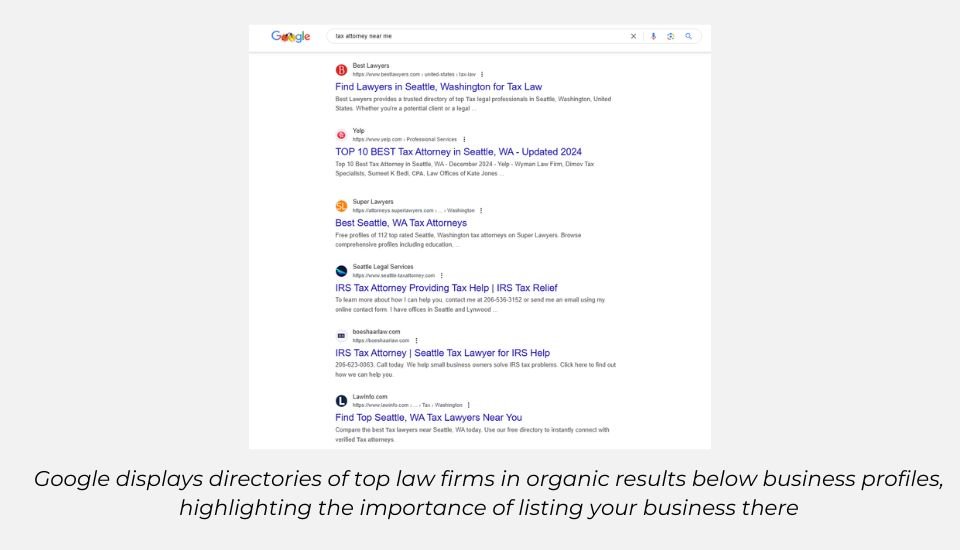
Local law firm directories are specialized listings that cater specifically to legal professionals within a particular area. These directories help potential clients find and connect with law firms that are conveniently located and specialize in the services they need. They play a crucial role in local SEO, helping your firm rank higher in local search results and attract clients from your community.
Yelp serves as a crucial platform for law firms by providing a trusted space where potential clients can read authentic testimonials and gain insights into the quality of legal services offered. As one of the most widely recognized review platforms, Yelp not only enhances a law firm’s online visibility but also builds credibility through client feedback and ratings. This transparency allows prospective clients to make informed decisions based on real experiences, establishing trust and encouraging them to choose your firm for their legal needs.
Avvo is a prominent online legal directory and marketplace connecting consumers with attorneys. Known for its comprehensive legal research capabilities, Avvo allows lawyers to showcase client reviews and expertise, aiding potential clients in finding legal professionals based on specific needs and location. The platform offers legal advice, lawyer ratings, and a vast database of legal information, establishing itself as a trusted resource for individuals seeking legal assistance and for law firms aiming to boost their online presence and client engagement. Avvo enhances visibility through client engagement features like Q&A sessions and review management, providing cost-effective marketing compared to traditional methods. To list a law firm on Avvo, firms need to create an account, complete a detailed lawyer profile with relevant credentials, and actively manage client reviews and profile updates to maintain credibility and attract more clients.
Martindale-Hubbell, the largest legal directory in the United States, hosts a vast database covering 46% of American lawyers, making it a premier resource for clients seeking legal counsel and a powerful tool for enhancing a law firm’s visibility. With over a century of history, Martindale-Hubbell operates as a prestigious legal directory and rating service, leveraging peer and client reviews to evaluate lawyers and firms. For law firms, listing on Martindale-Hubbell offers significant advantages: it enhances credibility within the legal community, increases visibility to potential clients searching for representation, and provides a competitive edge through recognized excellence in legal practice. To list a firm, lawyers submit detailed profiles and undergo reviews, culminating in a published listing that showcases their reputation and capabilities to a wide audience of legal professionals and clients alike.
FindLaw serves as a highly trafficked platform that assists law firms in boosting online traffic and engaging clients effectively, drawing over 8 million monthly visitors. It offers robust marketing tools and a community-focused approach to highlight legal expertise. As a prominent online resource and directory for legal information and services, FindLaw caters primarily to law firms and legal professionals, providing comprehensive platforms for both consumers and industry insiders. FindLaw supports law firms through marketing solutions like website development, SEO, and online advertising, enhancing their online presence and client acquisition efforts. It also facilitates content distribution across its network, elevating firms’ visibility and credibility. To list a law firm on FindLaw, firms typically register on the website, complete detailed profiles including practice areas and attorney biographies, and may opt for marketing or directory listing packages to maximize their exposure and client engagement opportunities.
LexisNexis, a global leader in legal information and analytics, empowers law firms with expert advice and extensive resources supporting over 41,000 lawyers worldwide. Renowned for its comprehensive legal database, LexisNexis offers services ranging from legal research, including case law and statutes, to practice management tools that streamline case handling and client information management. It aids law firms in risk assessment and management through advanced analytics and provides market intelligence for informed strategic decisions. Listing a law firm on LexisNexis enhances visibility within the legal community and connects firms with potential clients seeking legal services. Access typically involves subscription or membership plans tailored to firm needs, requiring profile setup with detailed practice areas and attorney information, verified for accuracy and credibility. Leveraging LexisNexis enables law firms to elevate their legal capabilities, improve client service, and optimize overall firm performance.
Lawyers, founded by Darcy Marsh, serves as a prominent online platform connecting individuals and businesses with lawyers and law firms across various legal specialties. Known for its reliability and broad geographical reach, Lawyers.com enhances law firms’ online visibility by providing a prominent directory where they can list their services, specialties, and locations. This visibility increases firms’ exposure to potential clients actively searching for legal services online. The platform facilitates client referrals by matching individuals with law firms that meet their specific needs and geographic preferences, while also allowing listed firms to receive and showcase client reviews and ratings. Regularly updating and verifying profile information ensures authenticity and credibility, further leveraging Lawyers.com as a strategic tool for law firms aiming to expand their client base and enhance their reputation.
Nolo.com features a user-friendly directory of lawyers with extensive filtering options. It’s respected for its comprehensive attorney profiles, educational videos, and interactive Q&A sections that cater to legal consumers nationwide. Nolo is a comprehensive online legal resource that offers a variety of services for law firms, such as publishing self-help legal guides, providing DIY legal forms, and offering directories for attorney listings. Law firms can leverage Nolo to increase visibility, attract potential clients, and enhance their online presence by listing their services in Nolo’s attorney directory, which is visited by millions seeking legal assistance. To list a law firm on Nolo, firms typically need to sign up for an attorney profile, provide details about their practice areas, and may need to pay a fee, depending on the listing type. This platform helps law firms connect with clients who are actively searching for legal help, thus driving more traffic and potential business their way. It simplifies the process of connecting legal professionals with individuals in need of legal assistance.
With over 59,000 attorney profiles and categorized into 112 practice areas, LawTally offers a clean and easy-to-navigate interface. It’s known for providing substantial backlink opportunities and showcasing legal expertise effectively. It’s an online platform that connects clients with lawyers and law firms by providing detailed profiles, ratings, and reviews. It helps law firms increase visibility, attract potential clients, and build credibility through client testimonials. To list a law firm on LawTally, one needs to sign up on the platform, create a detailed profile by filling out necessary information such as firm name, practice areas, and contact details, and encourage clients to leave reviews to enhance the firm’s reputation and ranking on the site.
Listing on LawTally can be a strategic step for law firms looking to expand their client base and strengthen their online presence in the legal services marketplace.
Acquired by LegalZoom, Trailblazer Legal focuses on corporate and business law firms, providing robust search functionalities and comprehensive legal research capabilities. Trailblazer Legal is a platform designed to assist law firms in enhancing their online presence and connecting with potential clients more effectively. By listing on Trailblazer Legal, law firms gain visibility among users seeking legal services, thereby increasing their client base and improving accessibility. This platform not only promotes firms through comprehensive profiles that highlight their expertise and services but also facilitates client reviews and ratings, fostering trust and credibility. To list a law firm on Trailblazer Legal, complete your law firm’s profile with comprehensive information, including practice areas, contact details, and any specialties. Verify your credentials and ensure that all information provided is accurate and up-to-date. Regularly update your profile and engage with potential clients or other users on the platform to maximize visibility and connections. Overall, Trailblazer Legal serves as a valuable tool for law firms looking to expand their reach and optimize their digital marketing strategies.
AmericanLawyer.com is a prominent directory offering free access to law students and serving as a valuable resource for legal professionals across the United States.The American Lawyer is a leading publication in the legal industry, known for providing insights and rankings that are highly respected within the legal community. It helps law firms by offering comprehensive analysis, trends, and rankings that allow firms to benchmark themselves against competitors, attract clients, and enhance their reputation in the legal marketplace. Law firms can list themselves on The American Lawyer by meeting specific criteria set by the publication, typically related to size, revenue, and other performance metrics that demonstrate their standing within the legal sector. Being listed can provide visibility and credibility, potentially leading to increased business opportunities and industry recognition. Listing on American Lawyer can enhance a firm’s prestige and visibility within the legal community, attracting top talent and clients seeking specialized legal services.
LegalZoom is an online platform that offers legal document services and business formation support to individuals and small businesses. It aids law firms by providing a wide array of legal document templates, incorporation services, and access to a broader client base through its extensive online presence. Law firms can leverage LegalZoom to streamline their document preparation processes, reduce operational costs, and reach potential clients who seek legal services online. To list a law firm on LegalZoom, one typically needs to sign up for their attorney directory service, provide relevant firm details, and complete the necessary verification steps to ensure accurate representation and compliance with LegalZoom’s standards. LegalZoom.com not only facilitates quick legal document creation but also offers a Local Attorney Directory for substantial online exposure and client referrals. Listing your law firm on LegalZoom can enhance visibility and potentially attract clients seeking legal services online.This process helps law firms reach a broader audience and potentially acquire clients who prefer online legal services.
Choosing the right legal directory can significantly impact your firm’s online presence and client acquisition efforts. Consider leveraging these platforms to establish a robust online following and enhance your firm’s visibility in the legal marketplace. Start by creating your profile on at least one of these directories today to expand your reach and attract potential clients effectively.
Keyword research for local law firms is a crucial aspect of digital marketing that can significantly enhance visibility and attract clients from specific geographic areas.
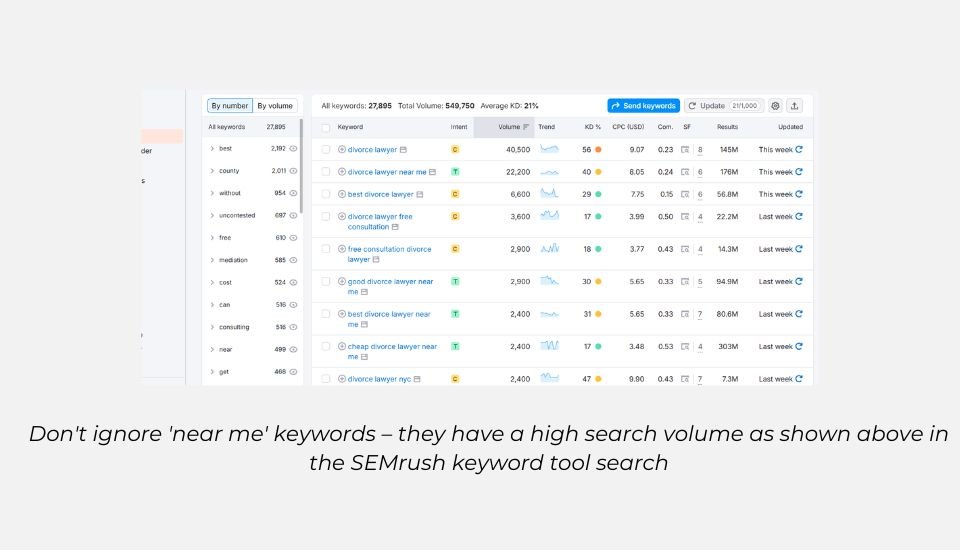
Here’s a detailed guide on how to conduct effective local keyword research tailored for law firms:
Localized organic results are search outcomes customized based on the user’s location, typically appearing prominently for location-specific queries like “lawyers near me.” It’s crucial to focus on top-of-the-funnel queries, such as “how to file for divorce in [City],” which are informational searches that potential clients conduct early in their decision-making process. These queries often generate localized results, even if they don’t explicitly mention geographic terms.
Define your geographic scope by identifying specific locations where you aim to attract clients, which could range from cities to neighborhoods or encompass multiple regions if your law firm operates in different areas. Additionally, consider expanding your reach to include nearby towns or suburbs, as clients from these adjacent areas might also seek your services.
To generate local seed keywords, begin with general terms relevant to your legal services, such as “personal injury lawyer,” “criminal defense attorney,” or “divorce lawyer.” Enhance these keywords by adding local modifiers like city names, neighborhoods, or landmarks, resulting in phrases such as “divorce lawyer in Chicago” or “personal injury attorney near Central Park.”
Google Keyword Planner, a free tool from Google Ads, is essential for businesses and individuals looking to enhance their SEO and PPC campaigns by providing estimated search volumes for specific keywords and suggesting related terms based on queries or URLs. It allows for detailed targeting by geographic area, helps tailor keyword strategies to local markets, and offers insights into competitor keywords to identify strategic opportunities. By understanding search trends and keyword demand, businesses can optimize their marketing efforts effectively.
BrightLocal SERP Checker is a tool designed to analyze search results based on geographic location, making it invaluable for businesses focused on local SEO. It allows you to simulate search results from different areas, revealing how location-specific results vary for the same query, such as “personal injury lawyer” differing in Los Angeles and Chicago. This helps in understanding local search behavior and competitors, enabling you to tailor your SEO strategy to regional preferences. Additionally, it supports geo-targeted SEO efforts by showing how your site ranks across various locations and tracks performance over time, offering a detailed view of your business’s local presence and helping you refine your strategies for maximum impact.
Google Trends is a valuable tool for analyzing the popularity of search terms over time and across regions, helping identify trends, seasonality, and regional interests in keywords. It tracks the rise or decline in search term popularity, allowing businesses to gauge interest, compare keyword performance across regions, recognize seasonal patterns, and uncover related topics for expanded content strategies. For example, it can show increasing searches for “cybersecurity law,” high demand for “bankruptcy lawyer” in distressed areas, and seasonal spikes in “tax attorney” queries during tax season. This tool helps businesses stay ahead by providing insights into evolving interest in legal topics, enabling them to optimize marketing strategies effectively.
To analyze competitor keywords effectively, start by identifying local law firms that rank highly for relevant search terms and examining the specific keywords they use. This involves a detailed review of the language and terms these competitors utilize on their websites and in their content. Using tools such as SEMRush and Ahrefs, you can delve deeper into their keyword strategies, uncovering which search terms are driving traffic to their sites and understanding the competitive landscape. These tools provide comprehensive data on keyword performance, including search volumes, competition levels, and the estimated traffic generated by these keywords.
By systematically analyzing this information, you can identify gaps and opportunities in your own keyword strategy, allowing you to enhance your online presence and improve your rankings in local search results. This approach not only helps in identifying high-value keywords but also offers insights into the broader market trends and competitor strategies, enabling you to develop a more effective and targeted SEO plan.
Current statistics indicate that 41% of adults use voice search at least once daily, allowing users to incorporate more keywords compared to typical browser searches. These queries tend to be conversational, averaging 29 words in length. To leverage this trend for better local reach, prioritize long-tail keywords that capture user intent. Voice searches often start with questions, so beginning with the Five Ws (who, what, where, why, when) and how can be highly effective. For instance, instead of a query like “family lawyer near me,” clients are more likely to ask, “Where is the closest family lawyer?” Additionally, it’s important to match the language level of these searches; while creating content, consider using a vocabulary that aligns with an 8th-grade reading level, as most voice searches are formulated at this level.
To optimize for local search intent, it is essential to focus on both geographically modified and non-geographically modified queries. Geographically modified queries include location-specific terms like “best personal injury lawyer in [City],” which directly target users searching for services in a particular area. On the other hand, non-geographically modified queries such as “best lawyer near me” don’t include explicit location terms but still yield local results due to the search engine’s understanding of the user’s location.
Alongside these, employing long-tail keywords and hyper-local focus can greatly enhance your SEO strategy. Long-tail keywords, such as “how to contest a will in [City],” are longer and more specific, typically attracting users with a higher intent who are further along in the decision-making process. Hyper-local keywords target specific neighborhoods or small areas (e.g., “real estate attorney in [Suburb]”), which often face less competition but still attract valuable traffic. Integrating these keyword strategies can help you capture a broader and more relevant audience, improving your visibility in local searches and driving more targeted traffic to your site.
Optimizing a website for a law firm involves careful planning and execution. By mapping keywords to the appropriate pages and focusing on detailed, relevant content, you can significantly enhance your website’s SEO performance. Prioritizing user experience and local relevance will not only improve your search engine rankings but also attract and convert more potential clients.
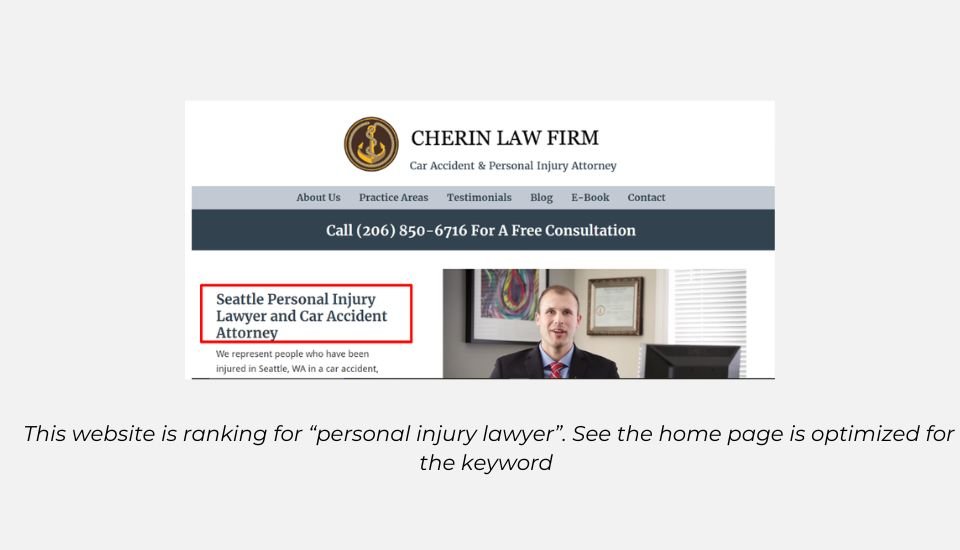
After conducting thorough keyword research, the next step is to map these keywords effectively to the right pages on your law firm’s website. This involves:
The home page serves as the central hub for your website and often ranks for broad, high-volume keywords. Here’s how to optimize the home page:
Service pages should focus on specific legal services your firm offers. Here’s how to optimize them:
For law firms serving multiple locations, creating and optimizing location-specific pages is crucial for local SEO. Here’s how to optimize location pages:
Optimizing your law firm’s website for mobile devices is crucial for both local SEO and client satisfaction.

Use page speed insights to check the website’s page speed on mobile and desktop.
Here’s how to ensure your site is mobile-friendly and provides a seamless experience for potential clients:
Ensure your website has a responsive design that adapts to various screen sizes, including smartphones and tablets. This design approach allows your site to automatically adjust its layout and content to fit different devices, making it easier for visitors to navigate and find the information they need.
Integrate a click-to-call button prominently on your website, especially on your contact and service pages. This feature allows potential clients to initiate a call to your firm directly from their mobile device, providing an easy and immediate way to connect with you.
By prioritizing mobile optimization and focusing on improving user experience, your law firm can attract and retain more clients. Mobile-friendly websites not only perform better in local search results but also offer potential clients the seamless, user-centric experience they expect. This proactive approach can set your firm apart in a competitive market and ensure that you remain accessible to those seeking legal assistance.
Enhancing your law firm’s local SEO involves leveraging advanced techniques to ensure your website stands out in search engine results. One of the most effective methods is implementing attorney schema markup. Schema markup is a form of structured data that adds context to your website content, making it easier for search engines to understand and display relevant information to potential clients.

Schema markup is a code that improves how search engines interpret website content. By incorporating this structured data, you can highlight specific details about your law firm, such as practice areas, attorney names, contact information, reviews, and more. This not only boosts your search visibility but also enhances the display of rich snippets in search engine results pages (SERPs).
To implement attorney schema markup, utilize tools like Google’s Structured Data Markup Helper or Schema.org. These resources guide you in identifying the appropriate schema types and provide code snippets that you can add to your website.
Google’s Structured Data Markup Helper: This tool helps you tag your website content with the correct schema markup.
Schema.org: A comprehensive resource for finding and generating schema markup codes tailored to various business types, including law firms.
After adding the schema markup to your website, it’s crucial to test the implementation using Google’s Structured Data Testing Tool. This ensures that the structured data is correctly applied and generates the desired results. Proper testing can help identify any errors or issues, allowing you to make necessary adjustments for optimal performance.
Incorporating schema markup into your law firm’s website is a powerful strategy to enhance local SEO efforts. By providing structured data, you help search engines better understand and display your content, leading to improved search visibility and more attractive search results. Utilize tools like Google’s Structured Data Markup Helper and Schema.org to implement and test your schema markup effectively. With these steps, your law firm can stand out in local search results and attract more potential clients.
Social media is not just a tool for connecting with friends and sharing personal updates; it’s also a powerful platform for businesses, including law firms, to boost their local SEO. For law firms, social media can help build brand awareness, engage with the community, and attract new clients.
Here’s a detailed guide on how to leverage social media to enhance your local SEO efforts.
One of the keys to an effective social media strategy is consistent posting. Regularly share content that is relevant to your target audience, such as:
Consistency keeps your audience engaged and helps maintain a visible presence in local search results.
Incorporate a mix of text, images, and videos to make your content more engaging. Video content, especially, can be highly effective; consider creating short, informative videos about legal topics or offering tips on navigating legal processes.
When posting on social media, use location tags and encourage check-ins. For example, tag your posts with your law firm’s location. This helps increase visibility for users searching for local legal services. Ask clients and staff to check in at your law firm when they visit. This can enhance your visibility among their local connections. Using local hashtags can increase your reach within your community.
Local link building is a crucial component of SEO for law firms aiming to enhance their visibility within specific geographic regions. Unlike general link building strategies that focus on broader audiences, local link building targets local communities and relevant organizations to boost local search rankings. By strategically acquiring backlinks from local sources, such as community organizations, local businesses, and regional publications, law firms can improve their online authority and attract more clients within their target area.

One effective strategy for local link building is guest blogging or contributing content to local publications and industry-specific websites. By offering valuable insights and legal expertise through guest posts, law firms can earn authoritative backlinks while also establishing themselves as knowledgeable resources within the community.
Building relationships with local organizations is another powerful tactic. Law firms can connect with entities like bar associations, community groups, and non-profits through sponsorships, event participation, or collaborative initiatives. These interactions not only foster goodwill within the community but also present opportunities to secure backlinks from reputable local websites.
Collaborating with complementary local businesses provides additional avenues for link building. By forming strategic partnerships, law firms can engage in co-marketing activities or joint campaigns that include reciprocal linking arrangements. This approach not only expands outreach but also strengthens local SEO efforts through shared online visibility.
Monitoring online mentions of the law firm is essential for identifying potential link building opportunities. When websites mention the firm without linking back, outreach efforts can be directed towards requesting a link inclusion. This proactive approach helps maximize the impact of existing brand mentions and ensures comprehensive backlink coverage across digital platforms.
By implementing these local link building strategies, law firms can effectively enhance their online presence, improve local search rankings, and attract prospective clients within their geographic target market. Emphasizing quality, relevance, and genuine engagement with local entities fosters sustainable growth and establishes enduring connections within the community. For law firms committed to optimizing their local SEO strategy, integrating these tailored link building tactics is instrumental in achieving long-term success and visibility.
To maximize the visibility and competitiveness of a law firm in local search results, investing in local SEO is essential. The first and most critical step is to claim and optimize your Google Business Profile (formerly Google My Business). This profile is the cornerstone of local SEO efforts, providing crucial information such as the firm’s location, hours, contact details, and client reviews, which are prominently displayed in local search results and Google Maps. It acts as a primary touchpoint for potential clients, enhancing credibility and driving more organic traffic to the firm’s website.
Beyond the Google Business Profile, law firms should ensure their website is optimized for local keywords, includes location-specific content, and is mobile-friendly. Building local citations and maintaining consistent NAP (Name, Address, Phone Number) information across various directories further solidifies local search presence. Engaging with the local community through social media and acquiring local backlinks can also boost a law firm’s local SEO. By integrating these strategies, law firms can effectively enhance their online presence, attract more local clients, and establish a strong foothold in their community.

